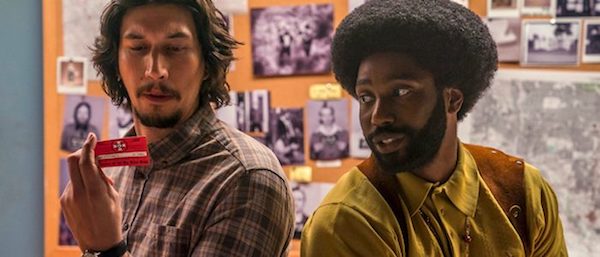
ReelBob: ‘Blackkklansman’ ★★★
By Bob Bloom
Ron Stallworth was an intelligent, ambitious young black man who dreamed of a career in law enforcement.
Thus, when the Colorado Springs Police Department decided to hire its first black recruit in the early 1970s, Stallworth jumped at the chance.
He was hired, despite being warned that, as the “Jackie Robinson” of the CSPD, he would face a lot of opposition and taunts from fellow officers.
That did not deter Stallworth, who began his career in the records room. The boredom, though, frustrated him, and he requested reassignment as an undercover detective.
Given an opportunity, he spotted a classified ad in the local newspaper seeking recruits for the local chapter of the Ku Klux Klan.
On impulse, Stallworth called the number and before you could put a match to a kerosene-soaked cross, he was involved in local KKK activities.
Sort of.
The story of Stallworth and his investigation of the Klan is told in Spike Lee’s “Blackkklansman,” a movie whose political and racist rhetoric resound so loudly today that it forces you to remember that this story is set nearly 45 years in the past.
“Blackkklansman” allows Lee to unleash his anger about the situation in 2018 America by masking it in a story of an investigation to shed light on the dark and hateful deeds of a group that — at least to the outside world — is trying to soften and politicize its image.
Tonally, the movie is erratic, as Lee switches from near-comical moments of Stallworth conversing on the phone with various Klan officials — most notably David Duke — to the actual undercover, face-to-face work done by fellow officer Flip Zimmerman.
Complicating it all, is Stallworth’s inexperience. When he first talks to local Klan leader Walter Breachway, he uses his real name instead of creating an alias.
Thus, Zimmerman must pose as Stallworth in his interactions with chapter members.
Underneath it all, “Blackkklansman” simmers with Lee’s sense of morality and righteous indignation about the treatment of black people in the United States.
The parallels to today’s climate are undeniable.
Early on, Stallworth is assigned to cover a speech that Stokely Carmichael is scheduled to give to members of a Colorado Springs’ college Black Union Students’ group.
This sequence is one of Lee’s best moments, as he cuts from the speech to individual faces of students absorbing Carmichael’s words of encouragement and empowerment.
The performances by John David Washington (son of Denzel) as Stallworth, Adam Driver as Zimmerman and Topher Grace as David Duke are very strong.
Washington brings an energy and near idealism to Stallworth, who explains that instead of protesting, he believes the best way to propel change is from the inside.
Washington reveals Stallworth’s inner conflict because he must lie about his job to the young woman he is dating, as well as hide his contempt and disgust for the Klansman he deals with over the phone.
The movie abounds in ironies. When Duke comes to Colorado Springs to visit the local chapter, Stallworth is assigned as his bodyguard, a move that visibly offends Duke and angers the local Klansmen.
Stallworth, though, silently revels in the job.
Driver shifts from resentment and reluctance about taking part in Stallworth’s undercover scam to seeing the true nature of the beast and working side-by-side with his young colleague.
Grace’s performance as Duke is very interesting, as he tries to obscure his racism under a veneer of patriotism and moderation.
When Stallworth, as his bodyguard, requests a picture and Duke reluctantly accepts, he explodes when the officer puts his arm around the Grand Wizard just as the photo is snapped. Duke’s true nature is thus revealed.
Lee’s editing is superb. A scene showing the reaction of the Klansmen and their families to a screening of D.W. Griffith’s “Birth of a Nation” mirrors the earlier sequence during Carmichael’s speech.
The white audience is more animated, shouting at the screen and cheering the scenes of the KKK members on horseback.
One of the movie’s shortcomings is that most of the Colorado Springs KKK members are portrayed as stereotypical redneck morons with grade-school IQs.
That, in effect, slightly dilutes their menace, making them more caricatures than serious threats.
Still, the overall premise of Lee’s movie is not negatively impacted. The director uses the movie to unload his resentment about his country where the more things change, the more they remain the same.
He closes with TV news footage of the events in Charlottesville, Va., as a sledgehammer reminder of that fact.
I am a member of the Indiana Film Journalists Association. My reviews appear at ReelBob (reelbob.com) and Rottentomatoes (www.rottentomatoes.com). I also review Blu-rays and DVDs. I can be reached by email at bobbloomjc@gmail.com or on Twitter @ReelBobBloom. Links to my reviews can be found on Facebook, Twitter, Google+ and LinkedIn.
BLACKKKLANSMAN
3 stars out of 4
Not rated, language, violence